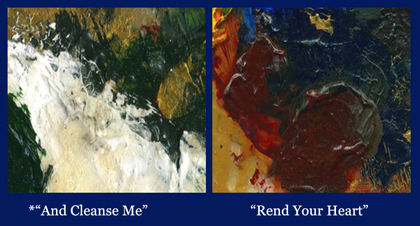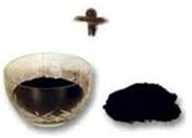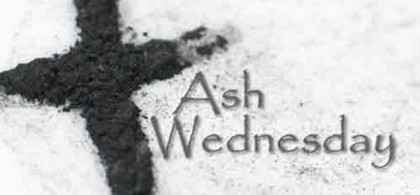Lectionary Commentaries

ASH WEDNESDAY
LECTIONARY COMMENTARY
Wednesday, February 13, 2013
The African American Lectionary Team
Lection – Isaiah 58:1-12 (New Revised Standard Version)
(v. 1) Shout out, do not hold back! Lift up your voice like a trumpet! Announce to my people their rebellion, to the house of Jacob their sins. (v. 2) Yet day after day they seek me and delight to know my ways, as if they were a nation that practiced righteousness and did not forsake the ordinance of their God; they ask of me righteous judgments, they delight to draw near to God.
(v. 3) “Why do we fast, but you do not see? Why humble ourselves, but you do not notice?” Look, you serve your own interest on your fast day, and oppress all your workers. (v. 4) Look, you fast only to quarrel and to fight and to strike with a wicked fist. Such fasting as you do today will not make your voice heard on high. (v. 5) Is such the fast that I choose, a day to humble oneself? Is it to bow down the head like a bulrush, and to lie in sackcloth and ashes? Will you call this a fast, a day acceptable to the Lord? (v. 6) Is not this the fast that I choose: to loose the bonds of injustice, to undo the thongs of the yoke, to let the oppressed go free, and to break every yoke? (v. 7) Is it not to share your bread with the hungry, and bring the homeless poor into your house; when you see the naked, to cover them, and not to hide yourself from your own kin?
(v. 8) Then your light shall break forth like the dawn, and your healing shall spring up quickly; your vindicator shall go before you, the glory of the Lord shall be your rear guard. (v. 9) Then you shall call, and the Lord will answer; you shall cry for help, and he will say, Here I am. If you remove the yoke from among you, the pointing of the finger, the speaking of evil, (v. 10) if you offer your food to the hungry and satisfy the needs of the afflicted, then your light shall rise in the darkness and your gloom be like the noonday. (v. 11) The Lord will guide you continually, and satisfy your needs in parched places, and make your bones strong; and you shall be like a watered garden, like a spring of water, whose waters never fail. (v. 12) Your ancient ruins shall be rebuilt; you shall raise up the foundations of many generations; you shall be called the repairer of the breach, the restorer of streets to live in.
I. Description of the Liturgical Moment
For the Lenten Season in 2013, The African American Lectionary will focus on the seldom-used spiritual discipline of fasting. Lectionary team member Dr. J. Cameron Carter’s skillful and spirit-filled compact unit for Lent will continue our discussion of fasting which we begin today.
This description for Ash Wednesday is provided by Dr. Elvin J. Parker III from the 2012 Ash Wednesday Compact Unit.

The ashes are made from the palms and palm fronds that were blessed, reserved, and now burned from the previous year’s Passion/Palm Sunday Services to be used for Ash Wednesday observance the next year. Each participant in the Observance receives the imposition of the ashes upon the forehead in the form of the cross. The imposition of ashes is a startling reminder of the shortness of human life as it is reflected in the Interment ritual, “earth to earth, ashes to ashes, dust to dust.” Ashes also point toward cleansing and renewal, as in ancient times ashes were often used in lieu of soap and water for bathing.
Persons wishing to participate in the Lenten Season Discipline are invited to come to the altar or the front of the Sanctuary where a minister will dip his or her thumb in the vessel that contains the ashes and with his or her thumb mark a small cross upon the forehead of the participant/penitent. When the ashes are imposed the verbiage that is generally used is, “From dust thou art, to dust thou shalt return. Repent and believe the Gospel,” or some such similar language.
When the size of the congregation is large, it is not unusual for the chief celebrant to have concelebrants to assist in the Imposition of Ashes. Forming several Imposing Stations for the convenience of the congregation will prove advantageous as well. When additional stations are used in those congregations that utilize the chancel rail as a kneeling place for the Imposition, several prie-dieus can be used at the various other stations. It is commonly expected that no ushering is necessary, as people move voluntarily toward the place of Imposition. During the act of Imposition silence may be kept, instrumental music may be performed, or there may be soft singing by a choir and/or the congregation.
The Ash Wednesday Observance Service is traditionally held at noon, though many congregations also hold a second Service in the evening so that as many persons who desire to participate may have an opportunity to do so.
II. Biblical Interpretation for Preaching and Worship: Isaiah 58:1-12
Part One: The Contemporary Contexts of the Interpreter
Isaiah is commanded of God to call out to the people of his generation. These people are people of words but not deeds and they are rebellious. They feign day in and day out that they are truly interested in knowing the ways of God. Isaiah says they do this “as if they were a nation that practiced righteousness and did not forsake the ordinance[s] of their God;” . . . “Why do we fast, but do not see? . . . Look, you serve your own interest on your fast day, and oppress all your workers.”
What a timely word. It’s almost as if Isaiah was watching us in the United States during the 2012 election season and its aftermath. Throughout 2012 political candidates offered their views on the type of country that we should be. All placed their faith forward as something that they dearly valued, and all espoused their great love for United States of America! But they said nary a word about the uplift of the poor. The poor were told that they had helped America become a nation of “takers not makers.” They were told that benefits they received in the form of Medicare, Medicaid, and food stamps were adding to the crippling debt that was ruining the American economy and had to be curtailed. They were told that they paid “no taxes” and that they “didn’t build anything, but the rich did.” Those who did not denigrate the poor just made them invisible, yet these were all men who often took opportunities to wear their faith on their sleeves.
Today, what was once called imperialism is now known in our country as nationalism. In the current version of nationalism, we are still “one nation under God,” but as Isaiah reminds us, the powerful “serve their own interest” and oppress workers. They “quarrel and fight” and “strike with a wicked fist.” Modernly, the quarreling is played out during the 24-hour news cycle, and the strikes are to those who are already beaten down. But who cares about the poor anyway? What candidate would waste political capital on them? And because our leaders make the poor invisible, they give the rest of us license and incentive to do the same and less.
We are incentivized to observe another Ash Wednesday clinging to our God and our guns but not to the poor. This is the new nationalism. We continue to lose our interest in and the courage to stand against the current version of nationalism. So instead of Ash Wednesday being a moment that allows us to reflect, repent, renew, pray, and personally sacrifice (even fast), it’s just business as usual even for the once venerable advocate for the poor—the Black Church.
 |
 |
But we live in hope. So, this Ash Wednesday we reminisce about the 2012 election which saw Barack Obama returned to the White House and the perhaps short-lived but important protest movement, the Occupy Movement. The words of Rachel Maddow, in a commercial for MSNBC, gives us our focus:
Nobody is going to kill Medicare.
We are not defunding Planned Parenthood.
We are not going to give a 20 percent tax cut to millionaires and billionaires.
We are not going to redefine rape.
We are not going to amend the United States Constitution to stop gay people from getting married.
We are not eliminating the Department of Energy.
We are not vetoing the Dream Act. We are not letting Detroit go bankrupt. We had the chance to do that if we wanted to do that, as a country. And we said no!. . .”
In an imaginary world, exactly what Maddow said would have been wrought by one election. But, in the real world, it’s after the election that the work begins. No, our voting did not make this a Lenten season where our work at the ballot box will do all of the work for us. It’s still our turn. Only now it’s our turn to do the really heavy lifting. So, to prepare us for the difficult, dangerous, and desperately needed work that it is ahead, we lift Ash Wednesday as an opportunity for us to assess, repent (for our inaction and our fearfulness), and then pick ourselves up, and as our ancestors said, “work out our soul salvation.” The work we do and leave undone shall speak for us.
Part Two: Biblical Commentary
We enter our text with Isaiah telling the people that God is not fooled by their pretending to want to be close to God. They have the gall to state that they are fasting and humbling themselves, and they complain that God is ignoring their noble spiritual acts. But Isaiah makes clear, “Such fasting as you do today will not make your voice heard on high.” What is the fasting God will accept in this Lenten Season? According to Isaiah, it has multiple components but one center—the concern of God for the poor and the oppressed.
What fast does God choose for us? Is it the popular new-age Daniel Fast that spawned books, websites, and work-out videos? Not according to Isaiah. Is it the fasting that we do to announce it to our church, family, and Facebook? Not according to Isaiah. Is it the fasting that announces the beginning of the season in which churches get busy preparing music, sermons, and services to get to Easter? Not according to Isaiah.
The fasting of which Isaiah and God speak is all about the poor and the oppressed! Hear ye the Word of the Lord:
IF we understand:IF we understand:
THEN:
THEN:
THEN:
IF we understand:
IF we understand:
THEN:
Our destiny is tied inextricably to the destiny of the poor. As we fast in this Lenten Season, Lord, set our minds and our deeds squarely on you and the poor.
Celebration
Verse twelve is the shouting verse in this passage. All we have to do to raise the foundations of many generations and repair the breach between those whose hearts have turned away from God and the godly and restore the streets on which we live is change how we treat the poor. That’s mighty good news. That’s what we call in grocery-store-shopping parlance a BOGO—buy one get one. But we get even more than that, if we buy into God’s system of treatment for the poor, we enable the poor and redeem ourselves, our children, and our communities.
Descriptive Details
The descriptive details in this passage include:
Sights: A prophet talking loudly to people; people sincerely humbling themselves; people in sackcloth and ashes; people loosening the bonds of injustice and undoing the thongs of yoke; the oppressed being set free; bread being shared with the hungry; the naked being covered; the light breaking forth like the dawn; healing springing up; God going before the people of God as their vindicator and rear guard; parched places; strong bones; streets being restored;
Sounds: Shouting; a trumpet sounding; people complaining that God is not taking note that they fast and humble themselves; the sound of quarreling; the sound of a striking fist; bonds being loosened; the homeless walking into our houses; light breaking forth; people crying for help; God answering those who care for the poor; ruins being rebuilt; the foundation of generations being raised; and
Colors: A gold, brass trumpet; grey and black ashes; dingy-colored clothing of the poor; the color of darkness and the color of light.
III. Other Sermonic Suggestions- The Desperate Preacher’s Site (www.desperatepreacher.com) hosts web-based discussion, conveniently divided into weekly discussion topics.
- Use the following image in slides and elsewhere as appropriate for Ash Wednesday.

Note
*Both of the images at the beginning of this commentary are by Jan L. Richardson. You can visit her website at PaintedPrayerbook.com.



